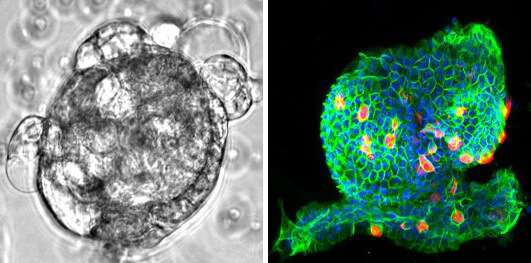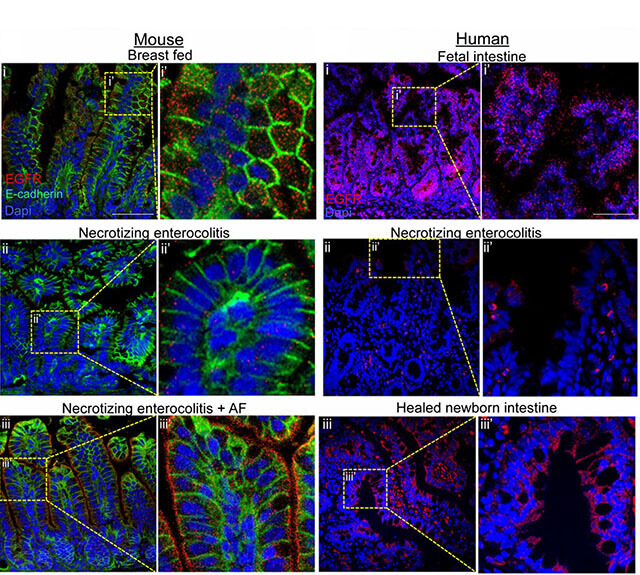Our Focus
Understanding the Development of Necrotizing Enterocolitis and Identifying Novel Treatments for This Devastating Disease
 Intestinal stem cells successfully grown in a protein gel medium in the lab
Intestinal stem cells successfully grown in a protein gel medium in the labNecrotizing enterocolitis is the leading cause of death and disability in premature infants. Simply put, the disease involves the sudden and seemingly inexplicable death of parts of the intestine, which leads to overwhelming sepsis and death of the baby in half of cases.
Necrotizing enterocolitis strikes suddenly and without warning. Typically manifesting as mild difficulty in tolerating feeding, within 24 hours it progresses to severe abdominal distention, high fever and often death. Unfortunately, treatment with antibiotics and surgery is often not successful.
The Hackam Lab is committed to understanding the cellular and molecular events leading to necrotizing enterocolitis development and identifying novel therapies for this devastating disease.
Specific Research
Generation of an Artificial Intestine
To grow and propagate intestinal stem cells onto a customized intestinal scaffold bearing the properties of human intestine, which will allow for nutrient absorption in the treatment of children with short bowel syndrome.
TLR4 Regulation and Signaling
 Decreased expression of the EGFR in the intestinal epithelium is associated with development of necrotizing enterocolitis.
Decreased expression of the EGFR in the intestinal epithelium is associated with development of necrotizing enterocolitis.Toll-like receptor-4 (TLR4) is an innate immune receptor that detects lipopolysaccharides (LPS). Previously, we have shown increased TLR4 expression and signaling on enterocytes in necrotizing enterocolitis, which leads to an exaggerated release of cytokines and impairs gut migration and proliferation. This discovery provides novel insights into a potential therapeutic strategy to reduce the severity of necrotizing enterocolitis and other intestinal diseases.
Gut Development
To understand the pathogenesis of necrotizing enterocolitis, it is crucial to understand the changes of the gut during fetal development and birth. This has led us to explore the role of TLR4 and TLR9 in gut development of preterm infants.
Stem Cell Biology
Our lab is seeking to understand the role of intestinal stem cells in gut injury, such as necrotizing enterocolitis.
Drug Discovery
Using specialized drug discovery methods, we are identifying new molecules that have the ability to decrease the amount of inflammation in the intestine in models of necrotizing enterocolitis. These reagents include natural products that are found in breast milk and amniotic fluid, as well as synthetic compounds.
And in collaboration with other labs, we have developed highly efficient drug screening assays to test novel compounds that may modulate toll-like receptors.
Brain
Understanding how gut inflammation leads to brain injury in premature infants.
Lung
Understanding how to harness the body’s ability to regenerate the lung.
Two key projects are currently helping us better understand the mechanisms involved in necrotizing enterocolitis:
- The role of the innate immune system in the pathogenesis of necrotizing enterocolitis
- Understanding how the host senses and responds to stress and injury in the pathogenesis of necrotizing enterocolitis

